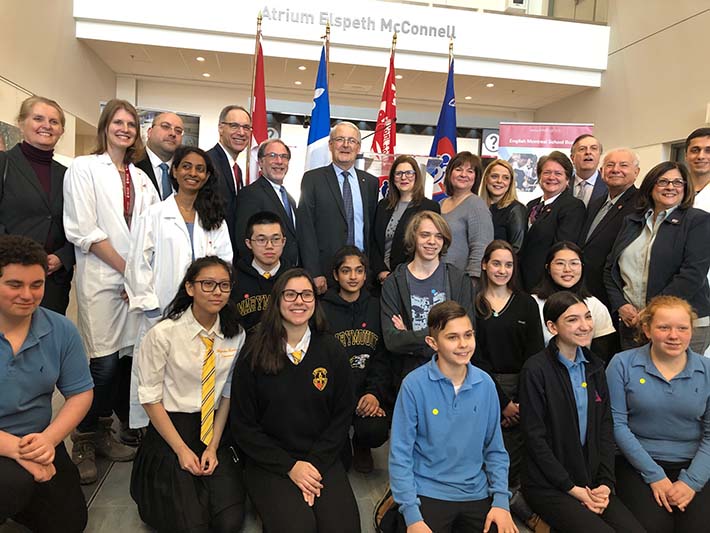EMSB and the Research Institute of the MUHC to launch historic STEAM partnership to engage youth in science

MONTREAL – The English Montreal School Board and the Research Institute of the McGill University Health Centre (RI-MUHC) are proud to launch a new initiative in which high-school students will collaborate with researchers on science, technology, engineering, arts and mathematics projects – also known as STEAM projects.
This unique partnership between a public educational institution and a large biomedical research center is based on the STEAM framework, an educational approach to learning that uses Science, Technology, Engineering, the Arts and Mathematics to guide student inquiry, dialogue and critical thinking.
Over 40 students from seven high schools of the EMSB, along with their teachers from various disciplines, will partner with laboratories at the RI-MUHC to produce STEAM-related projects. During a six-week period, graduate research trainees will dedicate their time, to mentoring students and guiding them throughout their projects.
“As the largest biomedical research Centre in Quebec, the RI-MUHC is proud to take part in this unique educational partnership and help high-school students prepare for the future. Using STEAM to create unprecedented community engagement is a fulfilling and rewarding mission for our institute and our trainees,” says Dr. Bruce Mazer, interim Executive Director and Chief Scientific Officer of the RI-MUHC.
A rich educational opportunity
For the last few years, the EMSB has been supporting and promoting the STEAM framework in numerous schools. The partnership with the RI-MUHC will allow the school board to further explore its possibilities.
“The EMSB is grateful and honoured that the RI-MUHC has opened its doors to us, giving our teachers and students this educationally rich opportunity,” says EMSB Chair Angela Mancini. “The relevant and dynamic learning environment of the RI-MUHC combined with real-life examples will not only foster creativity, but also encourage students to take thoughtful risks, engage in experiential learning and persist in problem-solving.”
“This project was possible thanks to the great collaboration between the EMSB and the RI-MUHC, two positive organizational leaders in my riding of NDG-Westmount,” says federal Transport Minister Marc Garneau. “ As a scientist myself, I know first-hand how important it is to introduce young Canadians to scientific thinking, a skill that will serve them throughout their careers. ”
“I am proud to see the RI-MUHC at the forefront of this educational initiative that will strengthen connections with a part of our community. The MUHC prides itself on the quality and innovation of its clinical and scientific training; we will make sure to inspire the next generation by sharing our knowledge and passion of the work here at our hospital and research institute,” adds Dr. Pierre Gfeller President and Executive Director of the MUHC
Skills for the future
By embracing the STEAM framework, the ESMB also hopes to better prepare students for the future.
“This partnership not only gives aspiring young students access to some of the best biomedical science being conducted internationally, it gives McGill research trainees the unique opportunity to inspire and help shape the next generation of creative thinkers and leaders,” explains David Eidelman, Vice-Principal of Health Affairs and Dean of Medicine at McGill University. “As an academic partner of the MUHC, we are very proud to see our teaching and research mission serve society in this way; and we applaud the RI-MUHC and EMSB for launching this project.”
“We have a responsibility to give back to our community in meaningful ways,” says Jenny Koulis, who manages the Office of Research Administration, Academic Affairs and Community Outreach Programs for the RI-MUHC and coordinates this project. “What better way to do this than by encouraging our children to develop the skills and knowledge they need to become the critical thinkers and innovators of the future?”
Media contacts:
Julie Robert
Communications – Research
McGill University Health Centre
Tel:(514) 971-4747
E-mail: [email protected]
